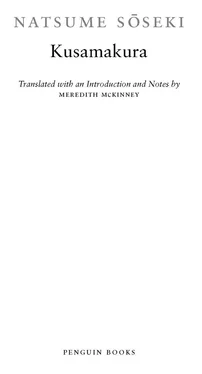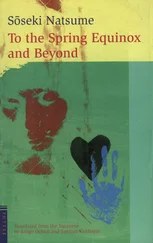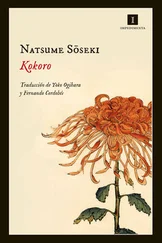Natsume Soseki - Kusamakura
Здесь есть возможность читать онлайн «Natsume Soseki - Kusamakura» весь текст электронной книги совершенно бесплатно (целиком полную версию без сокращений). В некоторых случаях можно слушать аудио, скачать через торрент в формате fb2 и присутствует краткое содержание. Жанр: Старинная литература, на английском языке. Описание произведения, (предисловие) а так же отзывы посетителей доступны на портале библиотеки ЛибКат.
- Название:Kusamakura
- Автор:
- Жанр:
- Год:неизвестен
- ISBN:нет данных
- Рейтинг книги:4 / 5. Голосов: 1
-
Избранное:Добавить в избранное
- Отзывы:
-
Ваша оценка:
- 80
- 1
- 2
- 3
- 4
- 5
Kusamakura: краткое содержание, описание и аннотация
Предлагаем к чтению аннотацию, описание, краткое содержание или предисловие (зависит от того, что написал сам автор книги «Kusamakura»). Если вы не нашли необходимую информацию о книге — напишите в комментариях, мы постараемся отыскать её.
Kusamakura — читать онлайн бесплатно полную книгу (весь текст) целиком
Ниже представлен текст книги, разбитый по страницам. Система сохранения места последней прочитанной страницы, позволяет с удобством читать онлайн бесплатно книгу «Kusamakura», без необходимости каждый раз заново искать на чём Вы остановились. Поставьте закладку, и сможете в любой момент перейти на страницу, на которой закончили чтение.
Интервал:
Закладка:
She arrives at the top of the steep path and emerges onto the flat top of the knol . To the north tower fold upon fold of spring’s green peaks, perhaps the view that I gazed up at from my balcony this morning. To the south is what seems like a burned area about fifty yards wide, and beyond it a crumbling cliff face; below lies the mandarin orchard I have just passed through, and beyond the distant vil age, al that meets the eye is that familiar expanse of blue sea.
The main path has become indistinguishable among the numerous tracks that meet and part and intersect. Al are a path of some sort, and none is the path itself. A further interesting confusion is the intriguing patches of dark red earth that are visible here and there in the grass, not clearly connected to this or that track.
I wander through the grass, looking for a place to settle myself down. The landscape that looked so suitable for painting when viewed from my balcony also seems suddenly to have lost its unity and coherence. Its color too is gradual y fading. As I plod stupidly hither and yon in this fashion, al desire to paint deserts me. With the need to paint gone, the selection of a place no longer matters—wherever I choose to sit wil become my home. The warmth of the spring sunlight has penetrated to the roots of the grass, and as I plump myself down, I sense that I am inadvertently crushing beneath me an invisible shimmer of heat haze.
Down beyond my feet shines the sea. The utterly cloudless spring sky casts its sunlight over the entire sea surface, imparting a warmth that suggests the sunlight has penetrated deep within its waves. A swath of delicate Prussian blue spreads lengthwise across it, and here and there an intricate play of colors swims over a layering of fine white-gold scales. Between the vastness of the spring sunlight that shines upon the world, and the vastness of the water that brims beneath it, the only visible thing is a single white sail no bigger than a little fingernail. The sail is absolutely motionless. Those ships that plied these waters in days gone by, bearing tributes from afar, must have looked like this. Apart from the sail, heaven and earth consist entirely of the world of shining sunlight and the world of sunlit sea.
I throw myself back onto the grass. My hat slips from my forehead and haloes my head. The grass is studded with little clumps of wild japonica bush one or two feet tal , and my face has come to rest just in front of one. Japonica is an interesting plant. Its branches obstinately refuse to bend, yet neither are they straight: each smal straight twig col ides with another smal straight twig at an angle, so that the whole branch consists of a series of obliques, tranquil y ornamented with rather pointless scarlet or white flowers, and a casual scattering of soft leaves to top it off. You could characterize the japonica as belonging to the type of the enlightened fool. Some in this world doggedly retain an awkward and innocent honesty—they wil be reborn as japonica. It’s the flower that I myself would like to become.
When I was a child, I once cut myself some twigs of japonica, complete with flowers and leaves, and arranged them attractively to make a rack for holding my writing brush. In it I propped a cheap, soft-haired brush, and seeing the contraption there before me on my desk, the white brush head peeping out from among the flowers and leaves, gave me great pleasure. When I went to bed that night, the japonica brush rack fil ed my thoughts.
As soon as I awoke the next morning, I leaped from my bed and ran to the desk—to discover the flowers drooping and the leaves dried. Only the brush head glowed there unaltered in their midst. That such a beautiful thing could wither and die in the space of a single night appal ed me. This earlier self seems to me now enviably unsul ied by the world.
The japonica that meets my eyes now, as soon as I lie back, is an old and intimate friend. As I gaze at it, my mind drifts pleasantly, and the impulse to poetry wel s up in me again.
Lying here, I ponder, and as each line of a Chinese poem comes to me, I jot it down in my sketchbook. After a little time, the poem seems complete. I reread it from the beginning.
Beset by thoughts I leave my gate.
The spring breeze stirs my robes.
Fragrant herbs have sprung in the wheel ruts.
The derelict track leads on into mists.
I halt and gaze about me.
Al is aglow with light.
I hear bush warblers at their song
And in my eyes are drifting cherry blossoms.
“At the road’s end a vast plain unfoldsâ€â€”
I write this line on an old temple’s door.
The lone walker’s solitude fil s the sky.
A single wild goose wings homeward through
the heavens.
What subtleties lie within one smal heart!
Right and wrong—forgotten in this eternal
moment.
Poised at thirty on the edge of old age
Yet now a soft spring light wraps me about.
Wandering thus, at one with nature’s changes,
I calmly breathe the fragrance al about.3
That’s it! I’ve done it! I’ve truly captured the feeling of lying here gazing at the japonica, al worldly thoughts forgotten. It doesn’t matter if the poem doesn’t actual y include the japonica, or the sea, as long as the feeling comes through. I give a groan of pleasure—and am astonished to hear the sound of a human clearing his throat not far from me.
Rol ing over, I peer in the direction of the voice. A man comes around the edge of the flat knol and emerges from among the trees.
His eyes are visible beneath the tilted rim of a dilapidated brown felt hat. I can’t make them out in detail, but they are evidently shifting uneasily. He is dressed rather indeterminately in an indigo-striped garment tucked up at the thighs, and bare feet in high clogs. The wild beard suggests he is one of those roaming mountain monks.
I assume he’l proceed on down the steep mountain path, but to my surprise he turns back at the edge and retraces his steps. Instead of disappearing back the way he came, however, he changes direction yet again. No one could be wandering to and fro on this grassy flat unless he were here to take a strol , surely. Yet this is hardly the figure of a mere strol er; nor would such a person be living hereabouts. The man pauses in his tracks from time to time, tilting his head questioningly, gazing al about him. He appears to be deep in thought. Perhaps he’s waiting for someone. I can’t make it out at al .
My eyes are held by this alarming fel ow. I’m not particularly afraid; nor do I feel tempted to draw him; it’s simply that my eyes are glued to him. My gaze continues to travel left and right, fol owing his movements, until suddenly he comes to a standstil —and then another human figure appears in the scene.
They seem to recognize each other, and both approach. Watching them, my vision gradual y focuses in on a single point in the middle of the grassy flat. Now these two figures come together face-to-face, with the spring mountains behind them and the spring sea before.
One, the man, is of course my wild mountain monk. And the other? The other is a woman—Nami.
As soon as I recognize her, this morning’s image of her holding the dagger returns to me. Could it be hidden in her robes now? I wonder, and for al my vaunted “nonemotional†stance, I shudder.
Facing each other, the two maintain their pose for a long moment. There is no hint of movement in either figure. Perhaps their mouths are moving, but no voices reach me. At length the man hangs his head, and the woman turns toward the mountains. I cannot see her face.
There in the mountains a bush warbler sings; the woman appears to listen to it. After a while the man raises his deeply bowed head and half-turns on his heels. Something odd is happening. The woman rapidly breaks her pose and turns to face the sea. Something peeps from her waistband—it must be that dagger. Head triumphantly high, the man begins to leave.
Читать дальшеИнтервал:
Закладка:
Похожие книги на «Kusamakura»
Представляем Вашему вниманию похожие книги на «Kusamakura» списком для выбора. Мы отобрали схожую по названию и смыслу литературу в надежде предоставить читателям больше вариантов отыскать новые, интересные, ещё непрочитанные произведения.
Обсуждение, отзывы о книге «Kusamakura» и просто собственные мнения читателей. Оставьте ваши комментарии, напишите, что Вы думаете о произведении, его смысле или главных героях. Укажите что конкретно понравилось, а что нет, и почему Вы так считаете.












